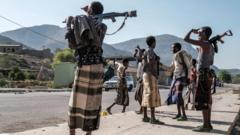The Tigray People's Liberation Front (TPLF), a prominent opposition party in Ethiopia, has raised alarms over a recent ban on its activities, which it claims could jeopardize the 2022 peace agreement that marked the end of a destructive two-year civil war in the Tigray region. In their statement, the TPLF described the ban as a "serious threat” to the fragile stability that has been achieved since the signing of the Pretoria peace accord.
The ban was issued by Ethiopia's National Election Board, which revoked the TPLF's legal status due to its failure to conduct a general assembly, a stipulation that has raised concerns about the party’s future. The TPLF has called upon the African Union to mediate with the federal government, urging intervention against what they perceive to be a move that undermines their legitimacy and the peace process itself.
Despite leading a coalition that governed Ethiopia for decades, the TPLF saw its power diminish after Prime Minister Abiy Ahmed took office in 2019 and dissolved the previous ruling coalition, leading to escalating tensions. The recent decision to ban the party follows months of political strife and comes at a sensitive time as Ethiopia faces impending nationwide elections, which are scheduled for June 2024 at the latest.
The party presently oversees Tigray's interim administration, established as part of the peace deal. However, internal divisions within the TPLF have prevented necessary elections from being conducted, with competing factions vying for control. In a letter to the African Union, the TPLF asserted that the ban contradicts the tenets of the peace agreement, which emphasizes the necessity of mutual recognition and dialogue.
Ammanuel Assefa, deputy chairman of the TPLF, expressed concern that the electoral board's decision could threaten the foundation of the Pretoria accord, an outcome he deemed dangerous. Assefa remarked, "This isn't just about the TPLF, but also about undermining what people have sacrificed." The ongoing delays in fulfilling the peace agreement, particularly regarding the return of approximately one million displaced individuals, are fuelling apprehensions about the potential for renewed conflict.
International observers, including representatives from the United States, United Kingdom, and European Union, have expressed concern over escalating tensions in the region and emphasized the need to prevent a resurgence of violence.



















